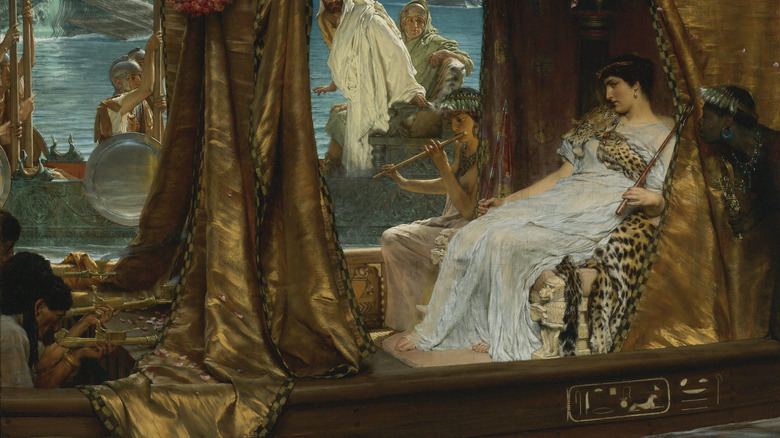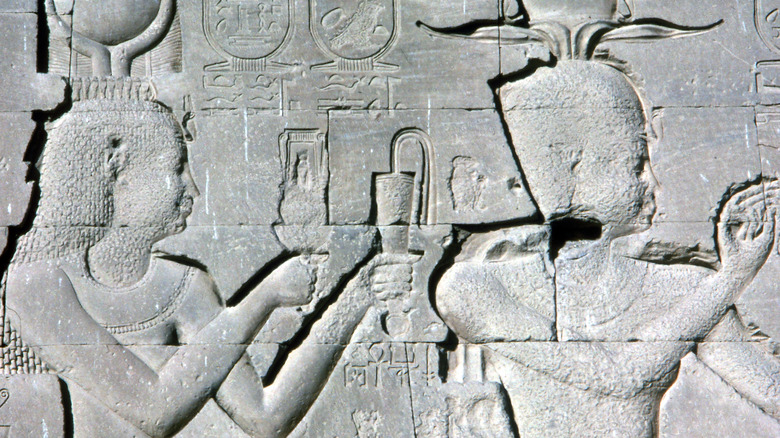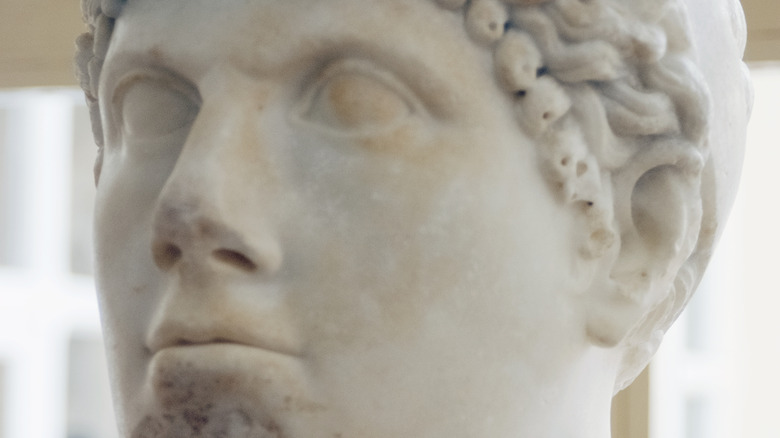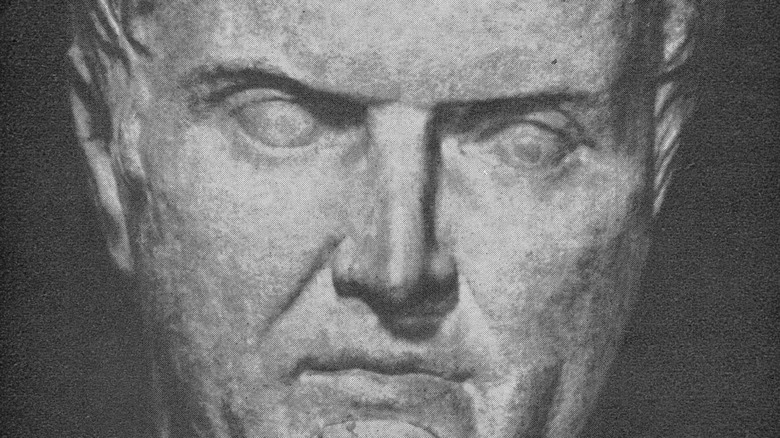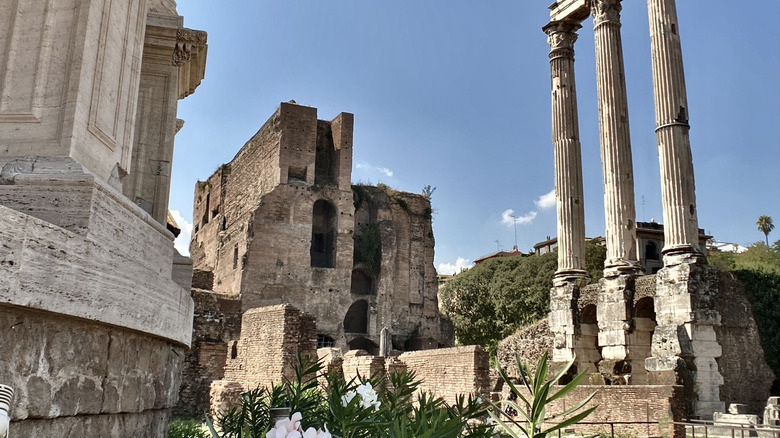What Happened To Cleopatra's Children?
Mention Cleopatra, and adjectives like "brilliant," "politically savvy," and "exotic" come to mind, propelled in no small part by the way filmmakers have co-opted her life and legacy to create a sultry, manipulative Queen of the Nile. Ruler of Egypt, partner of powerful Romans, even ruthless, sure — but Mommy?
She was born around 69 BC, officially Cleopatra VII Thea Philopator. She was born the daughter of a king, and in time inherited the throne, which she shared with her brother — she was 18, and he was 10. They probably married — that was the custom in that period in Egypt — but eventually, she wanted the throne to herself. Enter the Romans — specifically, Julius Caesar, with whom she had a relationship and perhaps a son, Caesarion (there's some controversy about his paternity). She followed Julius back to Rome but returned to Egypt after his assassination.
Enter another Roman, Mark Antony, part of the ruling aristocracy of Rome in the wake of the assassination of Julius. He and Cleopatra joined forces, resulting in three more children: twins, a boy and girl — Alexander Helios and Cleopatra Selene— and another son, Ptolemy Philadelphus. Long story short: things went south in Egypt; Mark Anthony, thinking Cleopatra had been killed, died by suicide; upon hearing the news, Cleopatra also died by suicide, traditionally via a poisonous snake, although that's generally discounted as a myth. And what of the children?
Son of Caesar?
Cleopatra gave birth to her first son, Caesarion also known as Ptolemy Philopator Philometor Caesar, on June 23, 47 BC. By age 3, he was co-ruler of Egypt with his mother. As to whether his father was Caesar (his name Caesarion translates to "little Caesar" in Greek) there is good evidence he was. According to the Roman writer Suetonius, Caesar unofficially recognized Caesarion while Cleopatra and her son were in Rome.
"Finally he called her to Rome and did not let her leave until he had ladened her with high honors and rich gifts, and he allowed her to give his name to the child which she bore," Suetonius wrote in his "The Life of Julius Caesar." "In fact, according to certain Greek writers, this child was very like Caesar in looks and carriage." Marc Antony declared Caesarion the rightful heir of Caesar since his rival, Octavian — the future Caesar Augustus — had been adopted. It sealed the boy's fate. Following Octavian's victory over Cleopatra and Antony's combined forces at the Battle of Actium on September 2, 31 BC, Octavian had Caesarion, about 17 years old at the time, murdered less than two weeks after Cleopatra's demise in 30 BC. The teen's death paved the way for Octavian to become Roman emperor.
Cleopatra Selene
The twins of Cleopatra and Marc Antony, Cleopatra Selene and Alexander Helios, were born in Alexandria in 40 BC. They were 3 years old the first time they met their father. While still a child, Antony named his daughter queen of Cyrene, an important city in what is now Libya, and parts of the island of Crete. After Octavian defeated Mark Antony and Cleopatra, he took the twins, who were about 11 at the time, and their younger brother, back to Rome with him as captives. After parading the twins through the city he gave them to his elder sister (Mark Antony's ex-wife) Octavia Minor, who raised them along with their three half-siblings.
Eventually, Augustus gave Cleopatra Selene in marriage to King Juba of Numidia (along with a nice dowry), making them allies of Rome, and sent her to rule Mauretania on behalf of the Roman Empire. They governed together for close to two decades, until Cleopatra Selene's death at the age of 35 in 5 BC. Her son, Ptolemy, reigned after his parents but had no children, thus becoming the last Ptolemaic ruler in a line that began with Alexander the Great's general, Ptolemy, in 305 BC.
Alexander Helios
Like Cleopatra Selene, Mark Antony gave several kingdoms to Alexander Helios while he was still a child, including Armenia and Media, among other territories. Antony also promised his son's hand in marriage to the Median princess Iotape. Following Octavian's defeat of their parents and the murder of their older brother, the twins, who had been in Thebes, returned to Alexandria where they ruled Egypt as figureheads until Rome officially annexed their kingdom.
After Octavian took the children to Rome, Alexander Helios lived with Octavia Minor in a sprawling household on the Palatine Hill in Rome among his half-siblings and Octavia's children from a previous marriage. The last mention of Alexander occurred during the celebrations commemorating Caesar Augustus' victories, in which he paraded the twins and an effigy of their mother with a snake biting her, through the streets of Rome in 29 BC. Helios' younger brother, Ptolemy Philadelphus, also disappeared from the record after being brought to Rome.
Ptolemy Philadelphus
The youngest of Cleopatra's children, Ptolemy Philadelphus, was born in 36 BC. Two years later, his father, Mark Antony, held a lavish ceremony in Alexandria. On a silver platform, Cleopatra and Antony sat on gold thrones with the four children sitting on smaller thrones and dressed in symbolic costumes. Ptolemy, just 2 years old, wore soldier's boots, a wool hat, and a cloak and held a crown, representing the Ptolemaic royal line, while Antony proclaimed him king of Syria and Asia Minor.
After Octavian took the children to Rome, It's believed Ptolemy Philadelphus, who was around 6 years old, died during the winter of 30-29 BC shortly after arriving there, or perhaps on the journey from Egypt. Historian Duane W. Roller in "Cleopatra: A Biography," suggests that the deaths of Cleopatra and Antony's two youngest sons in Rome weren't necessarily suspicious, since "child mortality was high in Rome, and the chilly damp winters would have been especially detrimental to children from Egypt."
If you or anyone you know is having suicidal thoughts, please call the National Suicide Prevention Lifeline by dialing 988 or by calling 1-800-273-TALK (8255).
